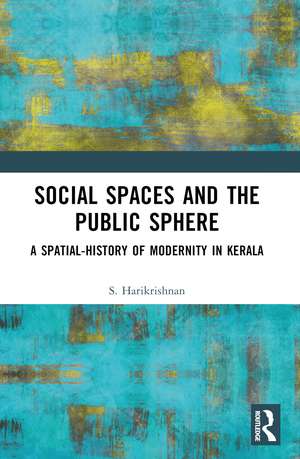Social Spaces and the Public Sphere: A Spatial-history of Modernity in Kerala
Autor S. Harikrishnanen Limba Engleză Paperback – 27 mai 2024
The volume focuses on how "modernity" has also been a struggle for access to public spaces, and non-institutional spaces like teashops, markets, public roads, temple grounds, reading rooms, and libraries have all been crucial to how political culture was shaped, and how dominant hegemonies—caste, class, or capital—have been challenged. It suggests that the secular public sphere that emerged in the last century in Kerala was a result of the constant negotiations between conflicting ideas which were put to test in these social spaces. At a time when digital spaces are fast replacing physical ones, this book is a timely reminder of the struggles that led to the emergence of secular public spaces in Kerala. It contributes to similar studies on public space that have emerged from other parts of the world over the last decades.
A major contribution to understanding modern India, this book will be of interest to scholars and researchers of social history, political science, political sociology, gender studies, linguistics, and South Asian studies.
| Toate formatele și edițiile | Preț | Express |
|---|---|---|
| Paperback (1) | 389.66 lei 6-8 săpt. | |
| Taylor & Francis – 27 mai 2024 | 389.66 lei 6-8 săpt. | |
| Hardback (1) | 711.72 lei 6-8 săpt. | |
| Taylor & Francis – 25 noi 2022 | 711.72 lei 6-8 săpt. |
Preț: 389.66 lei
Nou
Puncte Express: 584
Preț estimativ în valută:
74.56€ • 77.85$ • 61.71£
74.56€ • 77.85$ • 61.71£
Carte tipărită la comandă
Livrare economică 05-19 aprilie
Preluare comenzi: 021 569.72.76
Specificații
ISBN-13: 9781032361901
ISBN-10: 1032361905
Pagini: 252
Ilustrații: 60
Dimensiuni: 156 x 234 mm
Greutate: 0.45 kg
Ediția:1
Editura: Taylor & Francis
Colecția Routledge India
Locul publicării:Oxford, United Kingdom
ISBN-10: 1032361905
Pagini: 252
Ilustrații: 60
Dimensiuni: 156 x 234 mm
Greutate: 0.45 kg
Ediția:1
Editura: Taylor & Francis
Colecția Routledge India
Locul publicării:Oxford, United Kingdom
Public țintă
PostgraduateRecenzii
“This book weaves a range of microdata from a wide-ranging but coherent set of historical and contemporary sources to build a careful narrative of public spaces and a fresh take on theories of autogestion. Ethnographic material on contemporary Kerala's impeccably grassroots organising stands in contrast to the many studies of Kerala's entrenched regime of rival parties, and insists upon the centrality of the social, the everyday, the experiential and embodied” — Professor Caroline Osella, Research Associate, University of Sussex and
former Reader in Anthropology at SOAS, London
former Reader in Anthropology at SOAS, London
Notă biografică
S.Harikrishnan is a postdoctoral researcher at Dublin City University, where he completed his PhD in political science. He holds an MA in International Political Economy from King's College London and an MA in Development Studies from Tata Institute of Social Sciences, Mumbai. Hari's research interests include the politics of space, modernity, religion, and political culture. His research has been published in Social History, Brill’s Handbook of Hinduism in Europe, and TripleC, and his bylines have appeared on The News Minute, Interactions, Newslaundry, and Kafila. Hari is also a photographer whose works have been exhibited in India, South Africa, and Ireland. He is a founding editor of Ala, a monthly online publication on Kerala. This is his first monograph.
Cuprins
Foreword by Dilip Menon. Preface and Acknowledgements. 1. Introduction 2. Studying Space: Public Sphere and the Social Space 3. Making “Public”: Spatiality in Pre-modern to Early Modern Kerala 4. Moving “Out”: Nationalism, Socialism, and New Social Spaces 5. State, Capital, and the Struggle for Control 6. Capitalism, Communalism, and Social Spaces 7. Spatial Contests: Hegemony and Resistance
Descriere
The volume focuses on how ‘modernity’ has also been a struggle for access to public spaces, and non-institutional spaces like teashops, markets, public roads, temple grounds, reading-rooms and libraries have all been crucial to how political culture was shaped, and how dominant hegemonies—caste, class or capital—have been challenged.
